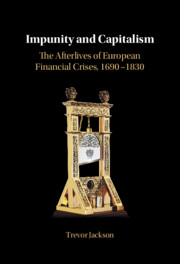4 - The End of the Old Financial Regime, 1781–1793
from Part II - Preface
Published online by Cambridge University Press: 08 September 2022
Summary
This chapter uses the financial records of the speculator Étienne Clavière to illustrate the normal workings of the eighteenth-century financial system and how that system came apart during the French Revolution, turning impunity into a political category. The 1780s witnessed a series of financial scandals and speculative bubbles, many of them organized by Clavière. These scandals delegitimized the last attempts to reform the old financial system, precipitating the outbreak of the French Revolution. Ensuing changes to the legal category of property rights, the issuing of the assignats in 1791, and the sequester of foreigners and foreign property under the Terror of 1793 broke the mechanisms of financial capitalism. The Terror, and especially the suspension of the Constitution of 1793 in favor of rule by penal code, marked the emergence of a new kind of purely political groups who existed outside the law, including various forms of financial criminals. The existence of a central bank in England meant that economic impunity became subordinated as a tool of political necessity; in France, economic impunity was coded as an enemy of political virtue. The Revolution was precipitated by financial scandals, tried to eliminate them, and ended up producing new ones.
- Type
- Chapter
- Information
- Impunity and CapitalismThe Afterlives of European Financial Crises, 1690–1830, pp. 141 - 176Publisher: Cambridge University PressPrint publication year: 2022



